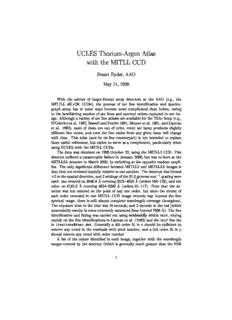
UCLES ThAr atlas PDF
Preview UCLES ThAr atlas
UCLES Thorium-Argon Atlas with the MITLL CCD Stuart Ryder, AAO May 21, 2000 With the advent of larger-format array detectors at the AAO (e.g., the MIT/LL 4K(cid:2)2K CCDs), the process of arc line identi(cid:12)cation and spectro- graph setup has in some ways become more complicated than before, owing to the bewildering number of arc lines and spectral orders captured in one im- age. AlthoughavarietyofarclineatlasesareavailablefortheThArlamp(e.g., D'Odoricoetal. 1987,BessellandPettini1991,Meureretal. 1991,andLipman et al. 1993), most of them are out of print, every arc lamp produces slightly di(cid:11)erent line ratios, and even the line ratios from any given lamp will change with time. This atlas (and its on-line counterpart) is not intended to replace these useful references, but rather to serve as a complement, particularly when using UCLES with the MITLL CCDs. The data was obtained on 1999 October 22, using the MITLL2 CCD. This detector su(cid:11)ereda catastrophicfailure in January2000,but wasre-bornasthe MITLL2A detectorin March2000,by switchingto theoppositereadout ampli- (cid:12)er. The only signi(cid:12)cant di(cid:11)erence between MITLL2 and MITLL2A images is thattheyarereversedlaterallyrelativetooneanother. Thedetectorwasbinned (cid:0)1 (cid:2)2inthespatialdirection,and2settingsofthe31.6groovesmm gratingwere used: one centred on 3946.0(cid:23)A covering3522{4653(cid:23)A (orders160{123),and the other on 6182.6 (cid:23)A covering 4824{9386 (cid:23)A (orders 61{117). Note that the de- tector was not centred on the peak of any one order, but since the extent of each order recorded in one MITLL CCD image extends way beyond the free spectral range, there is still almost complete wavelength coverage throughout. The exposure time in the blue was 10 seconds, and 2 seconds in the red (which unavoidablyresultsinsomeextremelysaturatedlinesbeyond7000(cid:23)A).Theline identi(cid:12)cation and (cid:12)tting was carried out using ecidentify within iraf, relying mainly on the line identi(cid:12)cations in Lipman et al. (1993)and the iraf line list in linelists$thar.dat. Generally a 4th order (cid:12)t in x should be su(cid:14)cient to remove any trend in the residuals with pixel number, and a 5th order (cid:12)t in y should remove any trend with order number. A list of the orders identi(cid:12)ed in each image, together with the wavelength ranges covered by the detector (which is generally much greater than the FSR 1 listed in Appendix A.2 ofthe UCLES manual),is given in Tables1 and 2, after whichplotsarepresentedwithmostoftheprominentlinesmarked. Theimages in Figures 1 and 2 show the raw XMEM display for the MITLL2A detector (MITLL3 images have the same orientation), which has wavelength increasing (order number decreasing) going from left to right, and redder wavelengths at the bottom of each order. Note that this is the reverse of the Tek CCD orientation, and when the (cid:12)les are saved in FITS format, they will then be reversedaboutthex-axis. Thus,it is not necessary to (cid:13)ip MITLL CCD images prior to reduction(asisusuallydonewithTekCCDimages)ifyouwishtohave wavelength increasing with pixel number along each order. References Bessell, M. S., & Pettini, M. 1991, UCLES Spectrum of the Thorium-Argon (cid:0)1 Hollow-Cathode Lamp. I. 79 grooves mm echelle grating and IPCS detector, AAO User Manual 28.1 (Sydney: AAO). D'Odorico, S., Ghigo, M., & Ponz, D. 1987, An Atlas of the Thorium-Argon Spectrum for the ESO Echelle Spectrograph in the 3400{9000 (cid:23)A region, ESO Scienti(cid:12)c Report No. 6 (Garching: ESO). Lipman, K., Pettini, M., Wall, M., & Walton, N. 1993, UES Spectrum of Thorium-Argon Hollow-Cathode Lamp, ING La Palma Technical Note No. 91 (Cambridge: RGO). Meurer, G. R., Pettini, M., & Stathakis, R. A. 1991, UCLES Spectrum of the (cid:0)1 Thorium-Argon Hollow-Cathode Lamp. II. 31.6 grooves mm echelle grating and Thomson CCD, AAO User Manual 34.1 (Sydney: AAO). 2 Order (cid:21) range ((cid:23)A) Order (cid:21) range ((cid:23)A) 61 9241{9386 90 6268{6365 62 9092{9234 91 6200{6297 63 8948{9088 92 6132{6229 64 8809{8945 93 6067{6162 65 8673{8808 94 6002{6097 66 8542{8674 95 5939{6031 67 8415{8545 96 5877{5969 68 8291{8421 97 5817{5909 69 8171{8298 98 5758{5848 70 8055{8180 99 5700{5790 71 7942{8067 100 5643{5730 72 7832{7954 101 5587{5674 73 7725{7845 102 5532{5619 74 7621{7741 103 5479{5564 75 7519{7636 104 5426{5511 76 7421{7538 105 5375{5460 77 7324{7439 106 5324{5406 78 7231{7343 107 5274{5356 79 7139{7251 108 5226{5308 80 7050{7160 109 5178{5260 81 6963{7073 110 5131{5211 82 6879{6986 111 5084{5164 83 6796{6903 112 5039{5119 84 6715{6820 113 4995{5072 85 6636{6741 114 4951{5028 86 6559{6661 115 4908{4985 87 6484{6586 116 4866{4943 88 6411{6511 117 4824{4899 89 6339{6439 Table 1: List ofordernumberscaptured by the redwavelengthsetting, and the respective wavelength ranges shown in the plots. 3 Figure 1: Raw XMEM display (stretched by a factor of 2 in the x direction) when the grating is set to 6182.6 (cid:23)A. The leftmost order which does not run o(cid:11) the edge of this image is order 117 the rightmost complete order is 61. The most heavily saturated line is at 8115(cid:23)A in order 70. 4
Description: